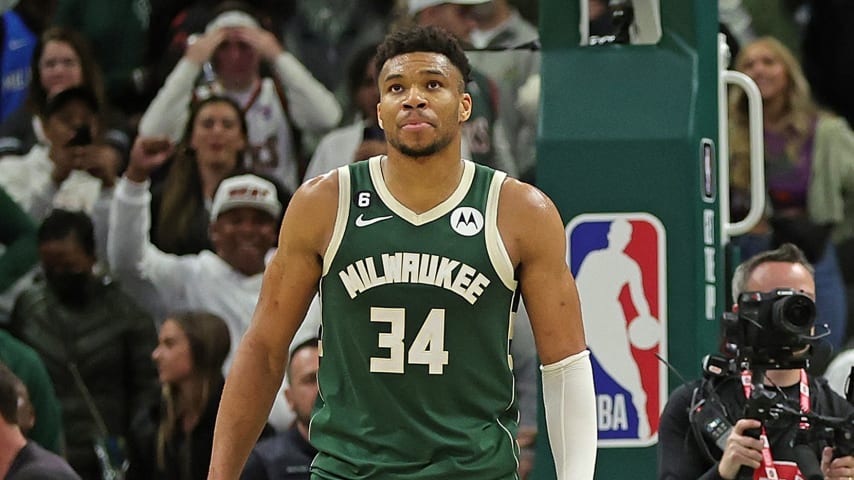If you loved Giannis’ speech, then golf is the sport for you
6 Min Read

Written by Sean Martin
I had two thoughts while watching Giannis Antetokounmpo’s Thursday night press conference, the one that's gone viral after he was asked if his team’s ouster from the NBA Playoffs was a failure. The first was a hearty, “Amen,” an appreciation for his ability to resist the temptation to fall into either anger or despair.
The second? Golf is the game for him.
There isn’t a class of athletes more accustomed to failure. It’s almost certain his speech was shared across PGA TOUR players’ group chats and WhatsApp threads. A healthy portion of those video views have undoubtedly come from golfers across the competitive spectrum.
Antetokounmpo’s attempt to escape the black-and-white binary of athletics – you either win or lose -- has resonated widely and transcended the sports world. In a world of immediacy, Antetokounmpo offered an alternative perspective. He preached the long view.
“It’s not a failure,” Antetokounmpo said. “It’s steps to success. There’s always steps to it. Michael Jordan played 15 years, won six championships, The other nine years (were) a failure? That’s what you’re telling me?
“It’s the wrong question,” he continued. “There’s no failure in sports. There’s good days, bad days. Some days you’re successful. Some days you’re not. Some days it’s your turn. Some days it’s not your turn. And that’s what sports is about.”
Many of golf’s greatest players endured failure before finally winning majors and becoming World Golf Hall of Famers. Ben Hogan, Tom Watson and Phil Mickelson are just a few. Rory McIlroy shot 80 to blow a four-shot lead in the final round of the 2011 Masters. He won his next major, the U.S. Open, by eight. Jordan Spieth lost a lead on the final day of the 2014 Masters. What did he do in his next trip to Augusta National? Tied the 72-hole scoring record in a wire-to-wire win.
David Duval was known for losing 54-hole leads before becoming nearly unbeatable, reaching No. 1 in the world during the Tiger era and winning both The Open and THE PLAYERS. Early in his career, Scottie Scheffler was questioning if he’d ever win. Between stints at world No. 1 and his wins at the Masters and THE PLAYERS, Scheffler lost a six-shot lead at the TOUR Championship.
Those losses? They were "steps to success" in Antetokounmpo's words.
No one in the modern game exemplifies Antetokounmpo’s message more than Max Homa, defending champion of next week’s Wells Fargo Championship. The world’s seventh-ranked player and winner of six PGA TOUR titles once earned $18,000 in a single PGA TOUR season, making just two cuts in the entire year. He won his first PGA TOUR title two years later at Quail Hollow.
“I refuse to give up,” he said after the win. “I refuse to give in and I believe that hard work will pay off if you keep your attitude in check.”
The winning percentage for even the most successful professional golfers more closely resembles that of the last-place Detroit Pistons than the first-place Bucks, who had the NBA’s best record before losing in the first round of the Playoffs. Throw in the missed cuts, chunked chips, lip-outs from 3 feet and blown leads, and there may not be a sport that offers more opportunities for embarrassment. Then you have things like the FedExCup standings and Korn Ferry Tour Points List that offer more opportunities for agony. And don’t get me started on Q-School.
A professional golfer will hit thousands of shots in a single year and sometimes a single one, some 0.01% of his output for the year, will be the difference between making it to East Lake or keeping his card. The course of some players’ careers, and lives, is determined in sudden-death. A PGA TOUR victory promises status for a lifetime, but shooting the low 72-hole score offers no consolation prize if another guy birdies the first extra hole. I asked a player who never won how often he thought about a missed putt that dropped him out of a playoff. His response? “Every day.”
Golf’s cruelty and disappointment is what it makes it most relatable, however. It’s the bond between us and the players. We can’t relate to the 350-yard drives or million-dollar checks (if you can, my Venmo will be at the end of this column). But struggle is universal. And that is why Antetokounmpo’s words resonated.
Golf is littered with examples of what the Bible calls “patient endurance” in the midst of hardships. There may not be a sport where patience is more highly rewarded. There’s the minutes between shots, hours between Nos. 1 and 18, days between rounds and the years between victories. Some players toil for a decade just to get a TOUR card, uncertain their efforts will ever be rewarded. There is no way to keep going without finding victory in the effort.
Tony Finau had to wait more than five years between his first and second PGA TOUR victories, a drought that belied his preternatural physical talents and was littered with several close calls. His win at last year’s 3M Open kicked off a run of three victories in seven starts.
“They say a winner is just a loser that just kept on trying, and that's me to a T,” Finau said after winning the Rocket Mortgage Classic, the second of those three wins. “How many times do I lose? But one thing I won't do is give up and I'm only here as a winner because I chose not to give up and just keep going."
Some will say Antetokounmpo’s answer was nothing more than a defense mechanism, a feeble attempt to put a positive spin on a poor result. A defense mechanism, at best. You either win or lose. Full stop. Some want public displays of atonement from athletes who disappoint them. An attempt to find positives in failure only adds to those fans’ frustrations, but doing so is the healthiest way to handle failure. Some would even say it takes courage and strength. It’s easier to be defined by results. It takes strength to rise above them.
“(The golfer) must have courage to keep trying in the face of ill luck or disappointment,” wrote Bobby Jones, the winner of 13 major championships. “As long as one continues to play golf, the happy periods will be followed by sorrow.” Jack Nicklaus once said that the only constant thing about the game “is its inconsistency.”
Few speak as eloquently today on the mental side of the game today than Homa. He surely appreciated Antetokounmpo’s speech but his biggest inspiration comes from another NBA legend: Kobe Bryant. It was from Bryant that Homa learned about the Stonecutter’s Credo.
“When nothing seems to help, I go and look at a stonecutter hammering away at his rock perhaps a hundred times without as much as a crack showing in it. Yet at the hundred and first blow it will split in two, and I know it was not that blow that did it, but all that had gone before,” it says.
Many times, failure isn’t an inability to break the rock. It’s to stop hammering.











